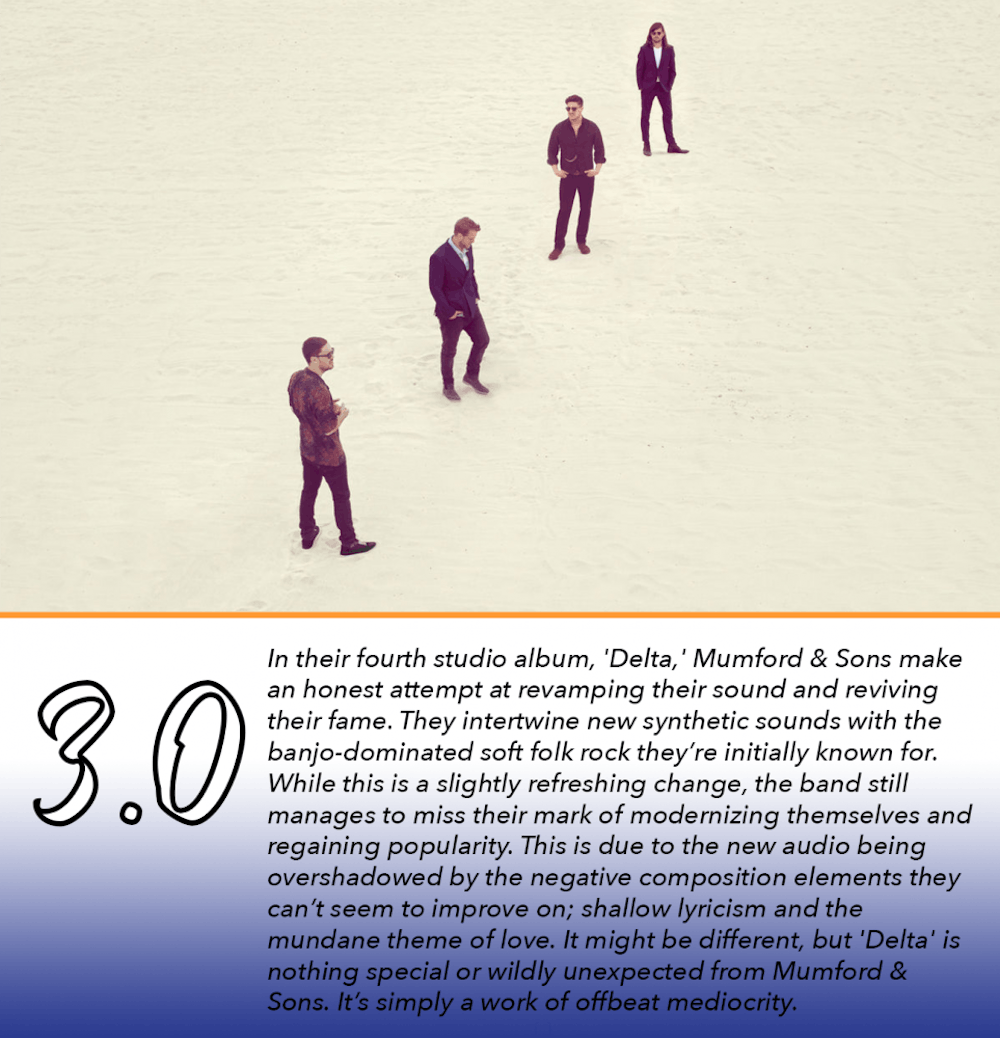There comes a time in every band’s career where they attempt to reinvent themselves in hopes of reviving their popularity. In the case of Mumford & Sons, this was long overdue. Their last three studio albums embody the same form of neo-folk rock with an exceptionally miserable vibe. While they still keep true to that well-established reputation, their latest album release, Delta, was produced with unfamiliar variations in instrumentation and synthetic sounds. Although this slight change of audio is refreshing, the band didn’t quite bring those modifications into the lyricism or theme, which formulates a uniquely mediocre album.
Modest step away from folk roots
For a band trying to reestablish themselves, their opening track, “42,” is a rather weak introduction to Delta. That being said, it sets an accurate precedent for the other 13 tracks. “42” is a prime example of the attempt Mumford & Sons is taking at refurbishing their sound while still trying to stick to their folk-rock roots. The overall tune adjustment is made with the addition of synthetic pulses that give this album its electronica vibe. This is a minor shock that listeners aren’t expecting from a band that initially served as the poster child for banjo-dominated indie folk songs. The contemporary vibrations are brought into spotlight in the songs “Picture You” and “Woman”. These, along with a few other tracks, encase the modernized melodies in a way that announces a different style for Mumford & Sons.
In addition to the synthetic reform, the band managed to keep in the stringed instrumental roots that built the band’s original claim to fame. Along with the preservation of string instruments, Mumford & Sons also maintain their harmonious lullaby vocals. The majority of the songs in Delta embrace the singing arrangement we’re used to. Many songs follow the same vocal structure; a single voice to accompany the verses and harmony to complement the build-up to the chorus. While all these elements work well together to create the new sound, the band still falls short of producing an awe-inspiring album.
To credit their creativity, Mumford & Sons did a decent job of blending the new with the old in a way that was pleasant to the ears. However, active listening is required to really recognize their ingenuity. The new unique melodies remain overshadowed by the things they still can’t seem to improve on. Even with the revamped sound, the flat lyricism and repetitive themes never fail to spoil the mood.
Scratching at surface level depression
After three albums saturated with sadness, the Mumford & Sons fanbase can’t be blamed for begging for just one light-hearted, happy song. Delta is the fourth album failing to answer that prayer. Another let-down in the realm of up-beat songs is disappointing, yet not shocking. But even as we’re left without joy, we’re not left in anguish either. Delta puts us in a middle zone, which leaves listeners feeling unaffected by their sorrowful tunes. Their first album, Sigh No More (2009), was a stroke of genius for those who love to cry to poetic heartbreak songs. The following albums, Babel (2012) and Wilder Mind (2015) barely kept that spirit alive. They could only survive as the band for go-to songs of woe for so long. It was in the best interest for them to renew their aura, but it’s evident they missed their mark in conjuring heartache as they once did.
Mumford & Sons topic of choice is and always has been love. Not to say this is necessarily a bad thing, but Delta takes this matter to a repetitive extreme. This album had no significant breakaway from the ballads of jeopardized relationships we’re all used to. With this release, the band stayed on track with theme, and it’s almost as if they stuck to the exact account over and over again. From start to finish, this album is like listening to 14 versions of the same love story, only with different soundtracks. Each song carries us through the hopes and fears of losing a love connection, which is clearly communicated through the lyrics.
Or perhaps, communicated a little too clearly.
After keeping the same general theme for years, it’s understandably hard to keep up the creativity in lyricism. Listening to Delta, it seems as though the songwriters ran out of metaphors and lost their eloquence. In the past, although the topic of love songs was relentlessly dominant, it was hard not to admire the depth and balladry that went into the lyrics. After all, that’s part of what formed their popularity in the first place. This album is truly a symbol of mediocrity in verse, but it’s good if you’re up for the challenge of listening to 61 minutes of shallow poetry. Maybe the new sound is a way to cover up the scarcity of ideas for deep lyricism.
The compilation of ordinary themes and lifeless lyrics offsets the attempt Mumford & Sons is making at provoking any sensationally low or high spirits with the new sound. The overall experience in listening to the album, in its essence, is moderately depressive. It’s perfect for light melancholy background music but look elsewhere if you’re searching for music to summon any deeper feelings.
Recommended if you like:
The Lumineers
The Head & The Heart
Of Monsters & Men
Top tracks:
Woman
Delta
Rose of Sharon

Featured Image: CoverMyTunes
For more entertainment related content, visit us at Byte BSU!
















